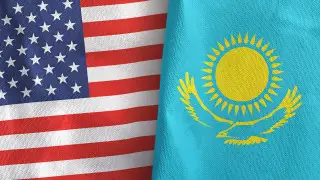Tengrinews.kz – U.S. President Donald Trump has announced the introduction of tariffs on all goods imported from abroad. Economist Eldar Shamsutdinov explained what consequences this may have for Kazakhstan.
Under the newly announced policy of “reciprocal tariff,” the U.S. is effectively doubling import rates on goods from Kazakhstan—from 27% to 54%. According to the expert, while the direct economic effect remains moderate, the long-term consequences could be significantly more serious.
“The U.S. is not a key trading partner for Kazakhstan. Exports to this country account for less than 0.5% of GDP, and the trade balance is already negative—with a deficit of about $1.5 billion,” Shamsutdinov explained.
The economist emphasized that the main risk lies not so much in the immediate damage, but in the signal this sends to the market and the potential multiplier effects.
“Goldman Sachs has already indicated that implementing such tariffs globally could add 0.5 percentage points to inflation in the U.S. and reduce GDP growth by 0.5 percentage points. This raises the probability of a global recession to 35%, according to GS. In such a scenario, the Federal Reserve may begin a rate-cutting cycle,” the expert noted.
Additionally, such actions increase market volatility and can drive demand for the U.S. dollar, which Shamsutdinov believes poses a threat to the Kazakhstani currency.
“In the context of a possible future yuan devaluation and rising global turbulence, the tenge could see a significant decline in value,” he added.
The economist also warned of the risk of growing competition with Russia, especially in the sectors of metals, oil products, and logistics.
“Against the backdrop of a potential rapprochement between Russia and the U.S., Russia may begin to restore its export positions. Kazakhstan, with its limited processing capacities and high dependence on external routes, may face displacement or underpricing from Russia,” Shamsutdinov noted.
The expert also emphasized that the situation will lead to increased inflationary pressure within the country. The rising cost of imports from the U.S.—especially in sectors such as technology, pharmaceuticals, and mechanical engineering—will create additional challenges for both businesses and consumers.
“Kazakhstan’s economy is deeply integrated into the dollar-based trade system, so imported inflation will place greater strain on businesses and citizens,” he explained.
In conclusion, Shamsutdinov pointed to other risks associated with the new tariffs. According to him, growing uncertainty—already intensified by rising CDS spreads and the decline in the stock market—may slow capital inflows and the implementation of foreign investment projects.
“In the short term, Kazakhstan should expect increased volatility in currency and debt markets, rising import inflation, and intensified competition for external markets,” the economist concluded.
He also added that in response to the heightened risks, a logical step would be to implement fiscal stimulus measures to avoid stagflation. In the long term, Kazakhstan must strengthen trade agreements with China, the EU, and Turkey, accelerate industrialization, and diversify its foreign currency reserves.
As a reminder, on April 2, President Trump announced the introduction of "reciprocal" tariffs on imports from other countries. The base minimum rate will be 10 percent, but for each country, the tariff will be adjusted to equal half the rate they charge U.S. companies for exporting American goods. Trump believes this will be a “declaration of economic independence” for the U.S. and will help redirect “trillions and trillions of dollars” to pay off the national debt.
Eldar Shamsutdinov is a financial sector expert with over 15 years of experience, specializing in project financing, M&A, and investment analysis. He is the author of the Telegram channel "Commentary."

